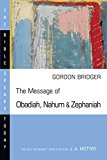The Message of Obadiah, Nahum, and Zephaniah: The Kindness and Severity of God. The Bible Speaks Today. By Gordon Bridger. Downers Grove, IL: Inter-Varsity Press, 2010. 303 pp. Cloth, $18.00.
Having never heard of Gordon Bridger or this series, I did not know what to expect from this commentary. I was very pleasantly surprised.
Most commentaries are either devotional or scholarly. This one is devotional, though Bridger shows he knows the messages of these books. He presents the material in such a way as to make it very accessible for the reader.
I did not realize until after reading the commentary that the author has long been a preacher as well as a teacher. Bridger is British and has ministered in England in pastoral work for over three decades. That explains the marvelous illustrations and applications given throughout. This work is very personal and practical. It would be very useful for personal Bible study, group study, and for the preparation of sermons.
Bridger often relates the words of Jesus to the message of these three OT prophets in delightfully relevant ways. He also gives modern correspondence to the sins of the past. For example, he says that worshippers of Baal also worshipped the stars, which he likens to modern astrology (p. 204). Similarly Baalism was rife with corrupt sexual practices, which are currently very problematic even in churches (p. 201). And he suggests that the worship of Baal was linked to striving for prosperity, a problem quite relevant in our materialistic culture today (p. 199). Though this reads like a popular Christian book, it is indeed a verse by verse commentary. It is very easy to read and to understand.
JOTGES readers will not find in this work a presentation of the Free Grace message. The author is not clear about the condition for everlasting life. At times he seems to imply that turning from one’s sins is a condition for escaping not only temporal judgment, but also for escaping eternal condemnation (e.g., pp. 24-27). However, since these three OT books are not evangelistic and are not presenting the condition of everlasting life, the reader should be able to overlook occasional comments by the author which are less than clear on justification by faith alone.
I would rate this as an excellent resource for preaching and teaching and personal study. I highly recommend this work.
Robert N. Wilkin
Editor
Journal of the Grace Evangelical Society
Denton, Texas


